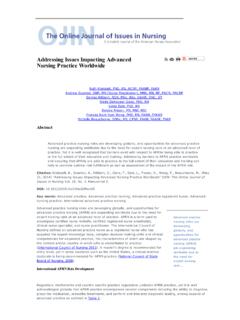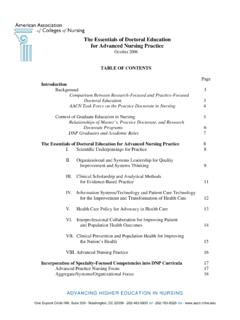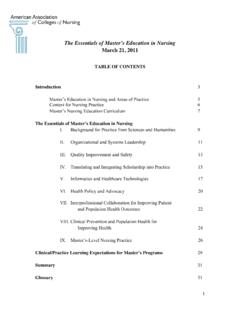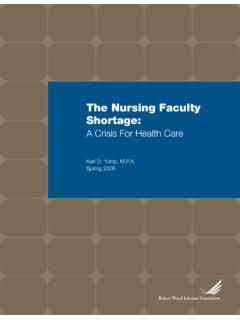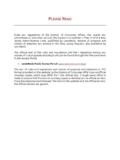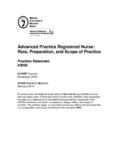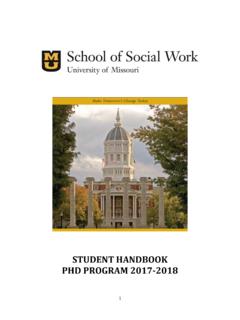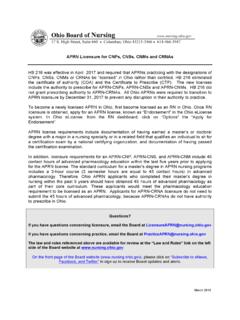Transcription of ICN Nurse Practitioner/ Advanced Practice Nursing …
1 ICN Nurse practitioner / Advanced Practice Nursing network Country Profiles Introductory statement: The International Council of Nurses (ICN) Nurse practitioner / Advanced Practice Nursing network Sub- group Practice ' and the Core Steering Group (CSG) are posting the below information, which has been submitted by Advanced Practice nurses describing the situation in their countries. We are providing this profile in order to make information more widely available on the status of Advanced Practice Nursing in different countries and regions of the world. Please note, however, that this information has not been generated through research carried out by the CSG or ICN. If you are planning to study or work as an APN in any country, please be in touch with the appropriate authorities in the country to verify education, Practice and regulatory requirements. 1. CONTENT. Please note that country profiles are ordered by the date last up-dated.
2 Profiles may therefore not follow an alphabetical order. The following depicts the list of country profiles included: September 2013. Canada Ireland Germany United Kingdom January 2014. China May 2014. Nigeria 2. Country: Canada Author: Kim Le Marche and Mary Ellen Andrews Version Number: 1. Last up-date: September 2013. The Advanced Practice role in Canada has evolved over the last decade, having been in existence since for over 40 years. Definitions and information for this update are based primarily on the work of the Canadian Nurses Association (CNA). According to the 2008 Canadian National ANP Framework, the agreed definition for ANP in Canada is: an umbrella term describing an Advanced level of clinical Nursing Practice that maximizes the use of graduate educational preparation, in-depth Nursing knowledge and expertise in meeting the health needs of individuals, families, groups, communities and populations.
3 It involves analyzing and synthesizing knowledge; understanding, interpreting and applying Nursing theory and research;. and developing and advancing Nursing knowledge and the profession as a whole (CNA 2008). Currently in Canada, there are two ANP roles recognized; the Nurse practitioner (NP) and the Clinical Nurse Specialist (CNS). Background Reading For those interested in a more thorough examination of the ANP role in Canada, in 2010 the journal Nursing Leadership published a special issue which focused entirely on a decision support synthesis paper (DeCenso et al., 2010) and nine other papers. Dicenso et al. describe the rest of the journal as follows The nine papers focus on various dimensions of the APN role in Canada. They include a historical account (Kaasalainen et al. 2010), an examination of educational issues (Martin-Misener et al. 2010), detailed summaries of the status of primary healthcare NPs (Donald et al.)
4 2010b), acute care NPs (Kilpatrick et al. 2010) and CNSs (Bryant-Lukosius et al. 2010), the role of Nursing leadership in integrating APN roles (Carter et al. 2010), an examination of title confusion and lack of role clarity as barriers to role implementation 3. (Donald et al. 2010a), factors enabling role integration (DiCenso et al. 2010c) and, finally, examples of innovative models that utilize NPs to increase patient access to primary healthcare (DiCenso et al. 2010a). These publications are considered to be highly valued Canadian publications, and speak to all facets of the ANP role and integration in Canada. Those interested in learning more can access the full special issue free of charge here. Nurse practitioner (NP). According to the CNA (2006) a NP is defined as a registered Nurse with additional educational preparation and experience who possesses and demonstrates the competencies to autonomously diagnose order and interpret diagnostic tests, prescribe pharmaceuticals and perform specific procedures within the legislated scope of Practice .
5 NP data is easier to track as they are regulated in all jurisdictions in Canada with a separate and distinct license. Currently, the NP is the only ANP role with additional regulation and title protection. The numbers of NPs registered doubled from 1,344 to 2,777. between 2007 and 2011 according to the Canadian Institute for Health Information (2011). Clinical Nurse Specialist (CNS). According to the CNA (2006) a CNS is defined as a registered Nurse who holds a master's or doctoral degree in Nursing with expertise in a clinical Nursing specialty; uses in-depth knowledge and skills, Advanced judgment and clinical experience in a Nursing specialty to assist in providing solutions for complex health-care issues. As part of work through the CNA in 2012, Verani (2012) developed a sourced background document to inform a strategic thinking round table of Canadian Nurse leaders interested in the CNS role. This document is called Strengthening the Role of the Clinical Nurse Specialist in Canada and is an excellent resource.
6 The estimate of actual numbers of CNSs below is taken from that document: There are approximately 2,200 self-identified CNSs in Canada according to 2009 CIHI. data. This number is considered to be high as this includes both baccalaureate and masters prepared nurses. Kilpatrick et al (2011) have estimated approximately 800. masters prepared CNSs in Canada using 2009 CIHI data. In a cross sectional survey of self-identified CNSs in Canada (with 59% response rate), we learn that the majority of this sample worked in urban settings (93%) and on inpatient units (62%). Majority (75%) saw patients in their Practice and worked in a broad range of specialty areas. Less than 50% of these CNSs were part of a union; 50% reported to a senior Nurse in the organization; and less than a third used a specific framework to guide their Practice . 4. Additionally, the authors concluded that the CNS numbers were highly vulnerable to cutbacks and policy decisions.
7 Education According to the CNA (2008): The minimum educational preparation for Advanced Nursing Practice is a graduate degree in Nursing . A Nurse with this type of graduate preparation has a thorough grounding in the theoretical foundation of Nursing and can promote Nursing research, generate new knowledge and use academic preparation, synthesis and knowledge- transfer skills to interpret and incorporate new knowledge into clinical Practice . Although a graduate degree is essential for Advanced Nursing Practice , nurses who have completed one or more graduate degrees cannot assume that their Practice is at an Advanced level on the basis of these educational credentials alone. It is the combination of graduate education and clinical experience that allows nurses to develop the competencies required in Advanced Nursing Practice . Interesting Web Links References Bryant-Lukosius, D., Carter, N., Kilpatrick, K.
8 , Martin-Misener, R., Donald, F., Kaasalainen, S., Harbman,P., et al. (2010). The Clinical Nurse Specialist Role in Canada. Journal of Nursing Leadership: Special Issue, 23, 140-166. Canadian Nurses Association.(2012). Strengthening the role of the clinical Nurse specialist in Canada. Unpublished background document DiCenso, A., Bryant-Lukosius, D., Martin-Misener, R., Donald, F., Abelson, J., Bourgeault, I., Kilpatrick, K., et al. (2010). Factors Enabling Advanced Practice Nursing Role Integration in Canada. Journal of Nursing Leadership: Special Issue, 23, 211-238. Dicenso, A., Martin-Misener, R., Bryant, Lukosius, D., Bourgeault, I., Kilpatrick, K., Donald, F., Kassalainen, S., et al. (2010). Advanced Practice Nursing in Canada: Overview of a Decision Support Synthesis. Journal of Nursing Leadership: Special Issue, 23, 15-34. 5. DiCenso, A., Bourgeault, I., Abelson, J., Martin-Misener, R., Donald, F.
9 , Kaasalainen, S., Carter, N., et al. (2010). Utilization of Nurse Practitioners to Increase Patient Access to Primary Healthcare in Canada Thinking Outside the Box. Journal of Nursing Leadership: Special Issue, 23, 239-259. Dicenso, A., & Bryant-Lukosius, D. (2011). Clinical Nurse Specialists and Nurse Practitioners in Canada: A. Decision Support Synthesis. Canadian Health Services Research Foundation. Donald, F., Martin-Misener, R., Bryant-Lukosius, D., Kilpatrick, K., Kaasalainen, S., Carter, N., et al. (2010). The Primary Healthcare Nurse practitioner Role in Canada. Nursing Leadership, 23, 88-113. Donald, F., Bryant-Lukosius, D., Martin-Misener, R., Kaasalainen, S., Kilpatrick, K., Carter, N, Harban, P., et al. (2010). Clinical Nurse Specialists and Nurse Practitioners: Title Confusion and Lack of Role Clarity. Journal of Nursing Leadership: Special Issue, 23, 189-210. Canadian Nurses Association.
10 (2008). Advanced Nursing Practice : A National Framework. Ottawa: Author. Canadian Nurses Association. (2006). Practice Frameworks for Nursing Practitioners. Ottawa: Author. Kilpatrick, K., Harbman, P., Carter, N., Martin-Misener, R., Bryant-Lukosius, D., Donald, F., Kaasalainen, S., et al. (2010). The Acute Care Nurse practitioner Role in Canada. Journal of Nursing Leadership: Special Issue, 23, 114-139. Martin-Misener, R., Bryant-Lukosius, D., Harbman, P., Donald, F., Kaasalainen, S., Carter, N., Kilpatrick, K., & DiCenso, A. (2010). Education of Advanced Practice Nurses in Canada. Journal of Nursing Leadership: Special Issue, 23, 61-84. 6. Country: Ireland Author: Gerald Kearns and Daniela Lehwaldt Version Number: 1. Last up-date: September 2013. Nursing and healthcare in Ireland has changed dramatically in the last two decades. Part of this change was the introduction of the Advanced Nurse /Midwife practitioner (ANP/AMP) role.
